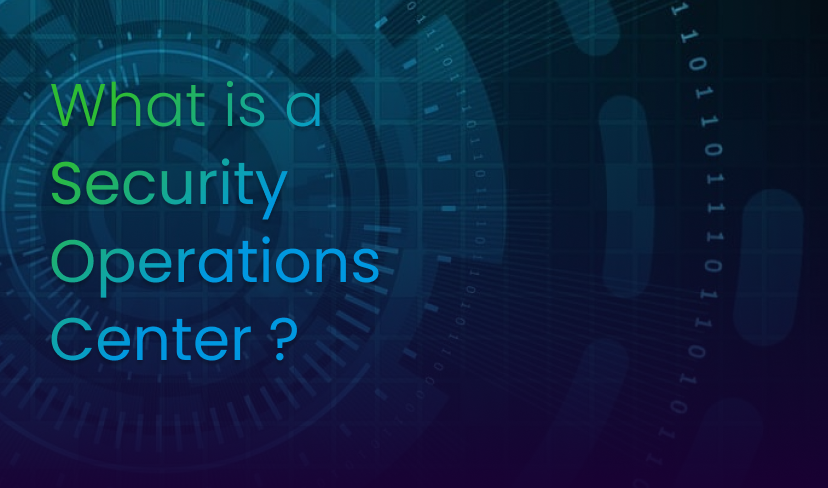In today’s rapidly evolving digital landscape, cybersecurity has become a paramount concern for businesses of all sizes. As cyber threats continue to grow in complexity and sophistication, organisations must invest in robust security measures to safeguard their sensitive data and digital assets. One such critical aspect of cybersecurity is the Security Operations Center. This blog will delve into the depths of SOC, providing valuable insights into its role, significance, and the impact it can have on enhancing a company’s cybersecurity.
Understanding SOC: A Definitive Guide
In this section, we will explore the core concept of a Security Operations Centre and how it serves as a proactive defence against cyber threats.
What is a Security Operations Center (SOC)?
At its essence, a SOC is a centralised unit within a company that is responsible for monitoring, detecting, and responding to cybersecurity incidents. It acts as the nerve centre, continuously analysing and safeguarding the organisation’s IT infrastructure from cyber threats.
The Role of SOC in Cybersecurity
The SOC plays a pivotal role in maintaining the confidentiality, integrity, and availability of critical data and systems. It serves as the first line of defence, acting as a proactive shield against potential security breaches and mitigating attacks in real-time.
Components of a SOC
This section will cover the key components that constitute an efficient SOC, including skilled personnel, advanced technology, and robust processes.
Skilled Security Analysts
A proficient SOC requires skilled security analysts with expertise in threat detection and incident response. These professionals are the backbone of the SOC, identifying and addressing security issues promptly.
Advanced Security Technologies
The SOC leverages cutting-edge security technologies, such as AI-driven threat intelligence, SIEM (Security Information and Event Management) systems, and behaviour analytics, to stay ahead of the ever-evolving threat landscape.
Incident Response Protocols
Having well-defined incident response protocols is critical for the SOC to handle security incidents effectively and efficiently. This section will explore the importance of incident response plans and their implementation.
SOC and Cybersecurity Best Practices
To maximise the efficiency of a SOC, organisations must adhere to cybersecurity best practices. This section will highlight some key practices that can enhance the SOC’s capabilities.
Regular Security Assessments
Conducting periodic security assessments enables the SOC to identify vulnerabilities and weaknesses in the organisation’s security posture, enabling proactive remediation.
Threat Intelligence Sharing
Collaboration with external threat intelligence sharing communities and government agencies empowers the SOC with real-time information about emerging threats.
Continuous Monitoring and Analysis
A 24/7 monitoring and analysis approach ensures that potential security incidents are identified and addressed promptly, reducing the risk of significant data breaches.
SOC vs. Managed Security Services (MSSP)
In this section, we will compare the SOC model with Managed Security Services to help organisations determine the best-fit solution for their cybersecurity needs.
The Benefits of Implementing a SOC
Implementing a SOC can offer numerous benefits to organisations. This section will outline the advantages of having a dedicated SOC in place.
Proactive Threat Detection and Mitigation
By continuously monitoring the network and systems, the SOC can detect and neutralise threats before they escalate, preventing potential data breaches.
Rapid Incident Response
With well-defined incident response plans and skilled analysts, the SOC can respond rapidly to security incidents, minimising downtime and damage.
Compliance and Regulatory Adherence
A robust SOC ensures that the organisation complies with industry regulations and standards, protecting sensitive customer data and preserving its reputation.
Conclusion
In conclusion, a Security Operations Centre (SOC) serves as the backbone of a company’s cybersecurity strategy. By implementing a SOC, organisations can enhance their ability to detect, respond to, and mitigate cyber threats effectively. The proactive approach of a SOC, coupled with advanced technologies and skilled personnel, empowers businesses to safeguard their digital assets and maintain a secure environment. To get started with Transputec and leverage the expertise of our professionals, contact us today.
Frequently Asked Questions (FAQs)
What sets a SOC apart from traditional IT security measures?
A SOC operates as a dedicated unit solely focused on monitoring and responding to cybersecurity incidents, providing a proactive and holistic approach to security.
Is a SOC suitable for small businesses?
Absolutely! While larger organisations may have more extensive security needs, implementing a SOC can benefit businesses of all sizes by bolstering their cybersecurity defences.
Can a SOC prevent all cyber attacks?
While a SOC significantly strengthens an organisation’s security posture, it cannot guarantee complete invulnerability. However, by leveraging advanced technologies and skilled analysts, it can effectively detect and mitigate a wide range of cyber threats.
What are the costs associated with implementing a SOC?
The costs of implementing a SOC can vary depending on factors such as the organisation’s size, security requirements, and the level of outsourcing. However, the investment in a SOC is often outweighed by the potential financial and reputational damage caused by a significant security breach.
How can I get in touch with Transputec to learn more about their SOC services?
To learn more about our SOC services and how Transputec can help protect your organisation from cyber threats, please visit our website here







